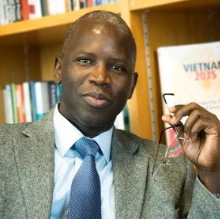 Ethiopia livestock
Ethiopia livestock
Previously published on December 23, 2023 in Addis Fortune.
Ethiopia’s livestock and fisheries sector holds immense potential for economic growth and development. With the largest livestock population in Africa and ranking fifth in the world, the sector accounts for nearly 20 percent of the country's GDP and employs a significant portion of the labor force. Furthermore, Ethiopia has untapped opportunities in the fisheries and aquaculture sector. Recognizing this potential, the World Bank and the government of the Federal Democratic Republic of Ethiopia have joined forces in a partnership to develop the sector. The Livestock and Fisheries Sector Development Project (LFSDP), financed by the World Bank and implemented by the Ministry of Agriculture, aims to unlock the sector's potential by promoting productivity and commercialization in the dairy, poultry, fisheries, and small ruminant value chains.
Recently we conducted a joint field visit to Hawassa in the Sidama region to assess the implementation of LFSDP. These joint missions hold great significance as they allow us to gain firsthand insights into the projects’ execution and understand their real-world implications. Our aim is to learn what is working, what is not, and what we can do better, to deliver bigger, faster and greater results for all Ethiopians.
Key Takeaways: The benefits of LFSDP goes beyond economic development.
One of the key strengths of the LFSDP is its focus on social inclusion. The project is creating income-generating opportunities for women and unemployed youth, empowering them to become active participants in the sector. Wehad the pleasure of meeting Haven and Adanech, two inspiring women who are actively involved in the dairy business. Along with their partners, Adanech and Haven manage ‘Burkito Milk Processing Center’ where they offer awide range of high-quality dairy products such as fresh cheese, creamy yogurt, rich butter, and other delectable dairy treats. Their business has not only generated a substantial income for themselves and their families but has also become a source of inspiration for other women in their community. Haven and Adanech's remarkable success story highlights the transformative power of initiatives like the LFSDP in empowering women. By providing them with the necessary resources, training, and support, programs like the LFSDP enable women to break barriers, overcome societal limitations, and achieve economic independence. Similarly, we interacted with Yosef and his friends, a group of young university graduates who have ventured into the poultry and livestock sector. These young Ethiopians are not only creating employment opportunities for themselves but are also contributing to the overall economic growth of the country. Their dedication and enthusiasm serve as a testament to the potential of the sector to promote job creation and youth empowerment.
The LFSDP contributes to building human capital by improving family nutrition. The project is enhancing the productivity and efficiency of the livestock and fisheries sector, which leads to increased availability and accessibility of nutritious food sources. This, in turn, improves the nutritional status of families and individuals, especially in rural areas where access to diverse and nutritious food can be limited. Improved nutrition has a direct impact on human capital as it enhances physical and cognitive development, leading to better health outcomes and improved productivity.
Furthermore, the LFSDP also ensures household food security by helping to increase the production and availabilityof food resources within communities. This reduces the reliance on external food sources and enhances the resilience of households in the face of food shortages or price fluctuations. When households have access to an adequate and stable food supply, it positively impacts their overall well- being and allows individuals to focus on other aspects of their lives, such as education and skill development.
Projects such as LFSDP could also play a crucial role in promoting peace and stability, especially in conflict-prone communities. By addressing youth unemployment, improving livelihoods, fostering social cohesion, and working in partnership with diverse stakeholders, LFSDP contributes to long-term stability. By creating economic opportunities, reducing poverty and inequality, and bringing together different communities to promote cooperation and shared responsibility, LFSDP and similar initiatives pave the way for a peaceful and prosperous future for all Ethiopians.
While LFSDP has made significant strides, there are still challenges that need to be addressed. The limited adoption of improved practices, inadequate support services, and a limited marketing and processing facilities hinder the growth of these sectors. To fully unlock the potential and maximize the impact of the project and the sectors, certain steps must be taken. Diversifying activities is crucial to reduce dependence on a single activity of the sector and promote resilience. Embracing new technologies and innovative practices will enhance productivity and efficiency. Establishing market linkages and improving value chains will ensure that farmers and producers have access to profitable markets. These measures will not only help the project beneficiaries but also contribute to the overall growth and development of the livestock and fisheries sectors.



Join the Conversation